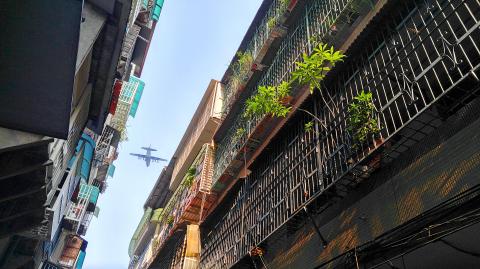Taipei folk like to joke about the city’s window grille culture, where residents seem to be huddled in self-imposed prisons like caged canaries. The grilles on the windows give them a sense of security. They are living an inherent contradiction, immersed in the whole and yet isolated from everyone else.
I hadn’t really thought much about them before. Not until one day, when I was out walking with a Swedish visitor, and we went into an alley in Wanhua District, Taipei. She suddenly stopped in her tracks, looked up and started staring at the second floor of an old apartment building. “How gorgeous these window grilles are,” she exclaimed. “Were they custom made?” It was only then that I really took notice of the wealth of geometric patterns boasted by the grilles in front of us.
They were arranged each to their own logic, each with their own completely distinctive pattern. Together with the cacophony of potted plants decorating the balconies, and the red lanterns hanging here and there, the effect was much like a piece of postmodernist art. Even the mottled rust covering the grilles seemed to speak of the vicissitudes of the people living there. Imagine the sense of security they imparted to the new residents when first installed.

Photo: Ethan Zhan, Taipei Times
照片:台北時報編譯詹豐造
The Swedish visitor asked me, “Is crime really that rife in Taipei? Why do people need so many grilles?” I was unable to come up with a good reason on the spot. But if you think about it, it has to be, in great part, psychological in nature.
On the one hand, there is the tangible window grille; on the other, the psychological grilles we erect within us. And the one does not exist in isolation of the other. Crime is but a secondary concern, but the grille-less feel naked by comparison, and fear themselves to be targets of thieves. And thus, window grilles quickly proliferated throughout the city.
Through these grilles, we can penetrate into how people in the city live, and how they think, and how they strive for a sense of security. This, then, is Taipei’s window grille culture, and an alternative form of urban art.
Source: Wu Chao-hui, Department of Information and Tourism, Taipei City Government, originally in the Taipei Pictorial, edition 571.
(Translated by Ethan Zhan, Taipei Times)
台北人總喜歡笑稱這座城市裡的鐵窗文化,彷彿像是金絲雀一樣把自己圈在籠子裡,家家戶戶靠著鐵窗架起了安全感,矛盾地過著一種融合又隔離的生活。直到一次散步行程中,我帶一位瑞典旅客走進萬華的巷子裡,她突然停下腳步,抬頭望著老公寓的二樓說:「這些鐵窗好美,都是請設計師設計的嗎?」我才仔細觀察到這些鐵窗的各種幾何圖形,它們的窗花有饒富邏輯的排列組合,每戶人家呈現完全不同的鐵窗風格,若搭配著陽台窗前綠意盎然的盆栽,或幾戶人家掛著的紅燈籠,看起來竟也像是一幅後現代主義的藝術品。就連斑駁的鐵鏽爬滿了鐵窗,也讓人彷彿看見歲月的變遷下每家每戶所經歷的故事,想像著當初新居落成時,架起鐵窗的安定感。
瑞典旅客問我﹕「台北治安不是很好嗎?為什麼需要這麼多鐵窗呢?」一時間我也說不出具體原因。仔細想想,心理層面的因素居多;有形的「住屋鐵窗」及無形的「心靈鐵窗」之間,其實有著相互影響的因果關係,治安考量反倒其次。因為心理上的不安全感,沒裝的人擔心自己成了竊賊的目標,於是鐵窗快速蔓延到城市的各個角落。
透過這些窗花,可以透視台北人的住宅生活面貌與心理狀態,以及如何追求生活中的安全感。這,就是台北的鐵窗文化,一種另類的城市藝術。
文/吳昭輝,臺北市政府觀光傳播局《台北畫刊》第571期
(台北時報詹豐造英譯)

A: In its latest annual travel guide, Bloomberg recommended two restaurants in Taipei: Golden Pig barbeque from South Korea and two-Michelin-star restaurant A. B: Also, tourists should definitely try Taiwanese cuisine while they’re here. Mountain & Sea House, Shin Yeh Taiwanese Cuisine, and Fujin Tree Taiwanese Cuisine & Champagne are good options. A: For local snacks, Fu Hang Soy Milk, Fu-Ba-Wang Pigs’ Knuckles Restaurant, and Wang Ji Rice Dumplings are all very popular. B: And the gold medalists of the 2025 Taipei International Beef Noodle Festival — Yun Shui Kitchen, The Howard Plaza Hotel Taipei, and Come N’ Eat

A: Bloomberg just released its annual travel guide, titled “25 Best Places to Travel in 2026.” What were the best Asian destinations? B: There were actually six Asian hotspots: Taiwan’s Taipei, Malaysia’s Penang, Kazakhstan’s Almaty, Indonesia’s Rote Island, India’s Tiger Reserves, and Oman. A: With its mix of traditional food and modern cuisine, Taipei has become a rising food capital in Asia. B: As Bloomberg reported, “Taiwan is a place that bubbles up in culinary conversation because of its famed beverage, bubble tea, and its early adoption of modern night markets.” A: And Din Tai Fung has now

Facing relentless flooding and rising expenses, Dumble Farm in England has stopped selling milk and started an unexpected but therapeutic venture: cow cuddles. In 2022, the owners sold most of their dairy cows and began letting visitors spend time brushing, petting, and even hugging specially trained Highland cows for 95 pounds per session. This unusual shift reflects the rise of the so-called healing economy, a sector where animal-assisted experiences are marketed as emotional remedies for stress and burnout. While dogs and cats remain the most common therapy animals, cows are gaining popularity for their calm nature. At Dumble Farm, only cows that

Owls have long fascinated people with their distinctive appearance and mysterious habits. These nocturnal birds possess large, round eyes and a flat facial disc. Their feathers come in shades of brown, gray, or white, helping them blend easily into the darkness. The most remarkable trait of owls is that they can turn their heads without damaging blood vessels. Contrary to popular belief, they can only rotate their heads up to 270 degrees, not 360 degrees. Owls have 14 cervical vertebrae, which is twice as many as humans. This special physical structure compensates for their inability to move their eyes within their